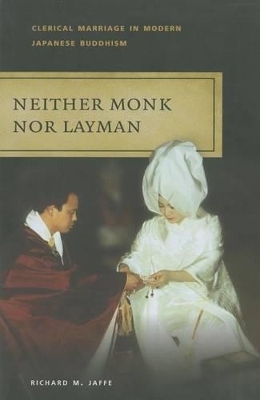
Neither Monk Nor Layman
Clerical Marriage in Modern Japanese Buddhism
2010
University of Hawai'i Press (Verlag)
978-0-8248-3527-9 (ISBN)
University of Hawai'i Press (Verlag)
978-0-8248-3527-9 (ISBN)
"Originally published in hardcover by Princeton University Press, Princeton and Oxford, in 2001"--T.p. verso.
Buddhism comes in many forms, but in Japan it stands apart from all the rest in one most striking way--the monks get married. In Neither Monk nor Layman, the most comprehensive study of this topic in any language, Richard Jaffe addresses the emergence of an openly married clergy as a momentous change in the history of modern Japanese Buddhism. He demonstrates, in clear and engaging prose, that this shift was not an easy one for Japanese Buddhists. Yet the transformation that began in the early Meiji period (1868-1912)--when monks were ordered by government authorities to marry, to have children, and to eat meat--today extends to all the country's Buddhist denominations.
Jaffe traces the gradual acceptance of clerical marriage by Japanese Buddhists from the premodern emergence of the clerical marriage problem in the Edo period to its widespread practice by the start of World War II. In doing so he considers related issues such as the dissolution of clerical status and the growing domestication of Japanese temple life. This book reveals the deep contradictions between sectarian teachings that continue to idealize renunciation and a clergy whose lives closely resemble those of their parishioners in modern Japanese society. It will attract not only scholars of religion and of Japanese history, but all those interested in the encounter-conflict between regimes of modernization and religious institutions and the fate of celibate religious practices in the twentieth century.
Buddhism comes in many forms, but in Japan it stands apart from all the rest in one most striking way--the monks get married. In Neither Monk nor Layman, the most comprehensive study of this topic in any language, Richard Jaffe addresses the emergence of an openly married clergy as a momentous change in the history of modern Japanese Buddhism. He demonstrates, in clear and engaging prose, that this shift was not an easy one for Japanese Buddhists. Yet the transformation that began in the early Meiji period (1868-1912)--when monks were ordered by government authorities to marry, to have children, and to eat meat--today extends to all the country's Buddhist denominations.
Jaffe traces the gradual acceptance of clerical marriage by Japanese Buddhists from the premodern emergence of the clerical marriage problem in the Edo period to its widespread practice by the start of World War II. In doing so he considers related issues such as the dissolution of clerical status and the growing domestication of Japanese temple life. This book reveals the deep contradictions between sectarian teachings that continue to idealize renunciation and a clergy whose lives closely resemble those of their parishioners in modern Japanese society. It will attract not only scholars of religion and of Japanese history, but all those interested in the encounter-conflict between regimes of modernization and religious institutions and the fate of celibate religious practices in the twentieth century.
| Zusatzinfo | 8 illustrations |
|---|---|
| Verlagsort | Honolulu, HI |
| Sprache | englisch |
| Gewicht | 540 g |
| Themenwelt | Geisteswissenschaften ► Religion / Theologie ► Buddhismus |
| Sozialwissenschaften ► Soziologie ► Spezielle Soziologien | |
| ISBN-10 | 0-8248-3527-1 / 0824835271 |
| ISBN-13 | 978-0-8248-3527-9 / 9780824835279 |
| Zustand | Neuware |
| Haben Sie eine Frage zum Produkt? |
Mehr entdecken
aus dem Bereich
aus dem Bereich
Philosophische Betrachtungen
Buch | Softcover (2024)
Aufbau TB (Verlag)
CHF 20,95
Unterweisungen in Zen-Meditation
Buch | Hardcover (2024)
Arkana (Verlag)
CHF 29,90


